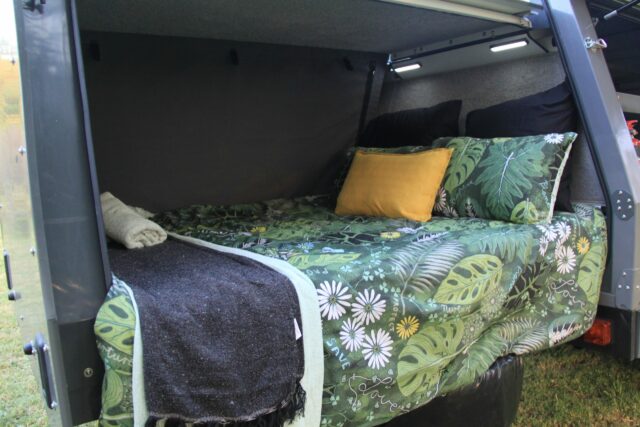I am pretty sure that the designer of the Hogzilla Xpander is a Cool Hand Luke fan. They must be, as the very first thing I thought of when I watched the video of the lady reclining in the Xpander bed was Arletta and her bed in the back of an old pickup truck. A mattress thrown in the back of an old pickup is how many of us started our overlanding “careers,” but modern travelers have become accustomed to a degree of comfort and convenience; the Hogzilla Xpander marries the old world with the new (if you squint your eyes and make a handstand).

One of the most distinctive features of the South African-made Xpander is its patented canopy design, which fundamentally alters the setup process of campers. The Xpander camper consists of three main components, namely the slide-out bed, the base canopy, and the overhang roof rack (ideal for double-cab vehicles), with a combined weight of 1,650 pounds dry. Unlike traditional rooftop or pop-up tents, which can be cumbersome and time-consuming to erect, the Xpander’s canopy expands quickly, providing shelter and comfort without compromising functionality. The Xpander canopy is constructed from durable, high-quality materials, featuring aircraft-grade aluminum and reinforced PVC canvas. The canopy’s design offers a variety of customizable options, including accessories like solar panels, awnings, and a dual spare wheel carrier that drops down from the rear.


The pull-out bed, which recedes into the cavity beneath the canopy, is complemented by a mattress measuring 78 x 56 x 7 inches and is supported by two ladders on either side that provide stability and ease of access. Lights and an internal canvas shell with privacy windows and essential mosquito netting are integrated into the slide-out sleeping area. Optional aluminum gullwing doors with a window and additional mosquito netting provide extra protection when traveling in lion country. Arletta could only wish for such comfort in her last days.


The camper includes various storage and functional features to enhance the camping experience. It comes equipped with a stove table and a larger table for dining and food preparation. The kitchen area features dedicated grocery storage compartments and an adaptable middle shelf suitable for a microwave. Additionally, a drop-down fridge-slider is designed to accommodate an 80-liter fridge, a two-burner cooker, and a cutlery/crockery drawer, enhancing organizational convenience. The camper is fitted with two Plastics for Africa 40-liter water tanks for water supply, ensuring ample water storage for extended trips.


Storage is another area where the Hogzilla Xpander is designed to excel. It offers expansive internal storage space, allowing adventurers to carry all their necessary equipment without feeling cramped. The integrated roof rack allows for the transportation of bulky but light items and outdoor essentials such as camping furniture and firewood.


Beyond the physical attributes, the Xpander is built with durability and resilience in mind, featuring what the company describes as “necessary armor” to withstand the rigors of off-road travel. This durability does not come at the expense of aesthetics or aerodynamics, as the camper boasts a sleek design that, apparently, reduces drag and improves fuel efficiency—a crucial factor for long-distance travel.
With pricing from $12,000 for the entry-level option with a ceiling of $ 20,000 for the full house option, the Xpander is relatively affordable in this age of astronomically priced canopy campers. The Xpander is built to fit the mid-size pickups most common in the South African market, such as the Toyota Hilux.
Read More: Practical Overland Knives : Buyers Guide
Our No Compromise Clause: We do not accept advertorial content or allow advertising to influence our coverage, and our contributors are guaranteed editorial independence. Overland International may earn a small commission from affiliate links included in this article. We appreciate your support.


